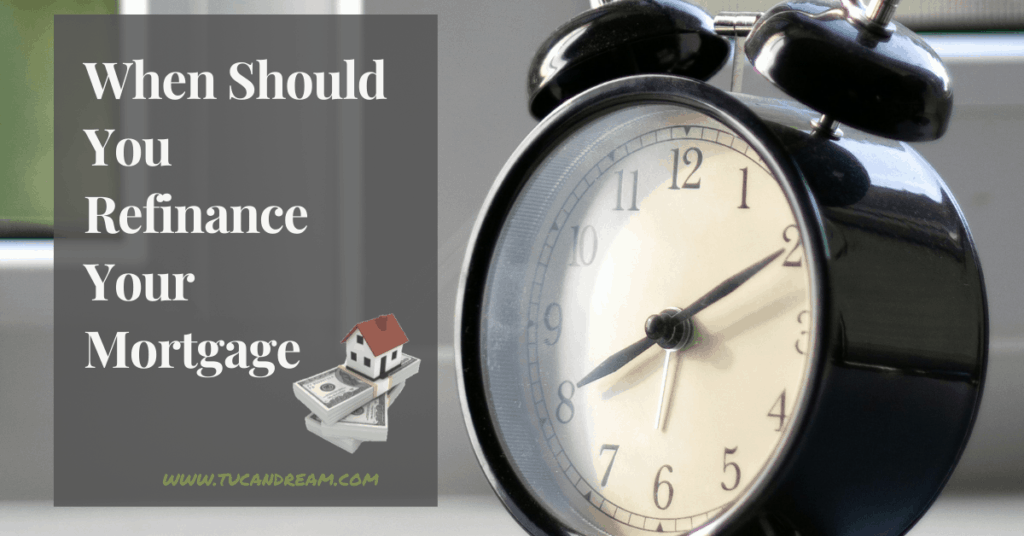When Should You Refinance your Mortgage?

When Should You Refinance Your Mortgage?
Table of Contents
As a CPA and tax preparer, I’m privileged to view many financial scenarios each year, and it has become very obvious to me that many people have no idea when it makes financial sense to refinance a mortgage and when it does not. Lower payments and lower interest rates don’t necessarily result in savings. Really, I’m serious.
Every individual’s scenario is different and each person needs to evaluate the pros and cons of refinancing. In this post I’ll lay out the pros and cons of different situations. I’ll take real-life examples and analyze them for you, and give you the knowledge you need to decide when should you refinance your mortgage.
A Lower Interest Rate Doesn’t Always Save you Money
You might wonder how this could be? You’re paying 5% now and you can refinance your mortgage at a rate of 3%, and I’m telling you you might not save money? That’s correct, let’s talk about the “hidden fees”
Refinancing is not cheap. It’s become the norm for lenders to just tack closing costs on to the balance of the loan during a refinance, so a $200,000 mortgage becomes a $208,000 mortgage. Closing fees usually run about 3-5% of the principal amount of the loan. . How long will it take you to pay down that additional $8,000, breakeven and start saving money?
This is actually a fairly easy calculation. Take your refinance costs and divide them by your monthly interest savings. The result is the number of months it will take you to recover those refinance costs.
Let me illustrate this with an example:
Outstanding mortgage balance: $200,000
Old mortgage rate: 5%
Balance after refinance: $208,000
New interest rate 3%
Payments remaining: 240 (20 year note)
Under the old note, the payments would be $1320, after refinancing that payment would be $1109 so a monthly savings of $211. The refinance costs of $8000 would take 38 months to recoup!
Be an Informed Borrower
I often see mortgages advertised as “no closing fees”, and I’m not sure how the lenders get away with this. Instead of you bringing cash to the closing table, they add the fees to the financed amount. How is this feeless? Ask what the fees are and demand to see the disclosure statement which lists out all the refinancing costs. I’m sure you will be shocked.
What You Need to Consider
How long do you plan on owning your home? Will you need more space for a new addition in your family? Or will you perhaps be downsizing since the baby birds have flown the coop?
If you’re likely to sell your home in the near future, refinancing your mortgage is probably not a good idea. In the previous example, it took a full 3 years and 2 months to just break even. Know your breakeven point-before that point you haven’t saved a penny by refinancing.
Debt Consolidation
Cash out refinancing for debt consolidation can be very tempting. You replace all your credit card debt and sometimes car loan debt with one payment. But I’m not a fan. This practice uses the equity you have accumulated in your home to pay down your other debt. But you really have to look at the true cost:
Let’s crunch some numbers.
Couple: He’s 65, she’s 58, he’s retired with pension income of 2K a month, she earns 150K a year.
They own their home valued at $350K, and owe $200K against it. APR of 6.75%, monthly payments of $1621.
They also have $75K in credit card debt.
They have decided to refinance and roll the $75K into a new 30 year loan.
The new loan terms are as follows: Interest rate of 3.5%, closing costs of $10,000. And new loan balance of:
Payoff old note: $200,000
Pay off Credit cards $75,000
Closing costs $10,000
Total $285,000
New monthly payments are $1280
While initially this looks very attractive, let’s take a closer look. They now have a home worth $350K with a mortgage of $285K against it, which they will be paying on for 30 more years (most likely for the rest of their lives). If there is another housing slump, they could have a hard time coming out right side up. They had only 18 years left to pay on the old mortgage but this refinance basically puts them back at square one. That $75K in credit card debt they rolled into the mortgage, It’s going to cost them $46K in interest over the term of the mortgage. Ouch! What should they have done differently?
I would have recommended they refinance their mortgage to take advantage of lower rates but only take a 20-year note. This would only add 2 years to their existing mortgage term. Payments on this mortgage (assuming the same closing costs and interest rate which in reality both should be lower), would be $1218 monthly. Then I’d take the monthly savings from their old payment to new of $400 a month and put it on the credit cards along with continuing monthly payments. This option hurts a little more in that monthly cash flow hasn’t been reduced but it will yield results much quicker. They could really knock out the credit card debt if they do a balance transfer to a zero or low percent card. With, the wife’s current take-home earnings of over $8,000 a month they can definitely knock out that credit card debt.
The upside of this latter scenario is that it will force the couple to live within their means. In the first scenario it’s highly likely the couple will go back to their old habits and end up with more credit card debt and now no equity in their house to pay it off with, and when the wife retires and has reduced income, what will they do?
Refinancing Alternatives
HELOC
Examine your options. Home Equity Line’s of Credit (HELOC’s) and recasting your mortgage can be good alternatives to a conventional refinance.
HELOC’s are very flexible and often come with much lower out of pocket fees. I’m currently considering paying off my existing mortgage with a HELOC. My situation:
I owe $160K on a home worth about $750K.
My current mortgage APR is 3.99%.
I know there are better options out there so I have investigated:
My current loan company is offering me a conventional refinance at 2.795% APR (int rate of 2.125% with closing fees of $8000 ). In my opinion, $8000 of costs on a 160K note is ludicrous (that’s 5% up front!) so I’ve researched HELOC’s and have found one that offers a 2.24% rate with what appears to be no closing fees, and an annual fee of $65.00. I’m pursuing this option and will update this post with the results. This option saves me about $200 a month.
Mortgage Recasting
Mortgage recasting is where you put a large sum towards your mortgage, and in return your lender reamortizes the remaining note, with lower monthly payments. There is no adjustment to the interest rate.
Refinancing Calculators

I highly recommend that before you hastily jump into a refinance, do some number crunching. There are numerous fee calculators on the internet. I recommend this one: Download Microsoft Excel Mortgage Calculator. It is free and also lets you view what the effect of making extra payments on your mortgage does to the balance.
Questions?
I’d be happy to examine your situation and advise on when you should refinance and whether it makes sense for you. Please feel free to leave your questions in the comments below.







4 Comments
Kimberlie
Thank you for the eye opening, informative post. I never thought about the effect refinancing fees could play. Thank you!
Carolyn
It is an eye-opener isn’t it?
Adrian
That’s a helpful post. We’ve refinanced a couple of times and wished we hadn’t. We were just moving the goalpost further and further away. Now we have a 15 year loan, so we actually have a chance to pay it off in our lifetime!
Carolyn
Im glad you have the end in sight now. Ive seen some people refinance twice within 2 years…the costs are incredible.